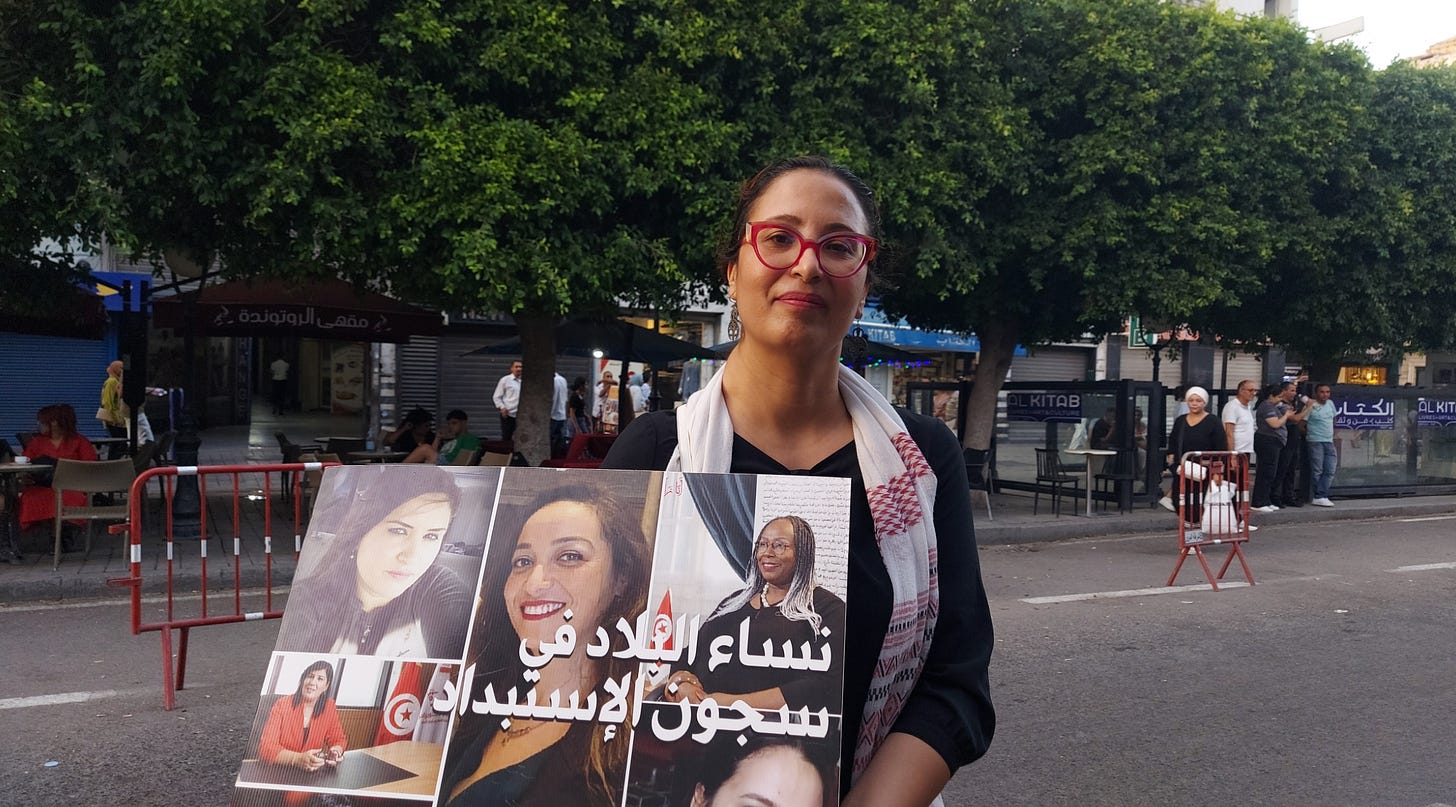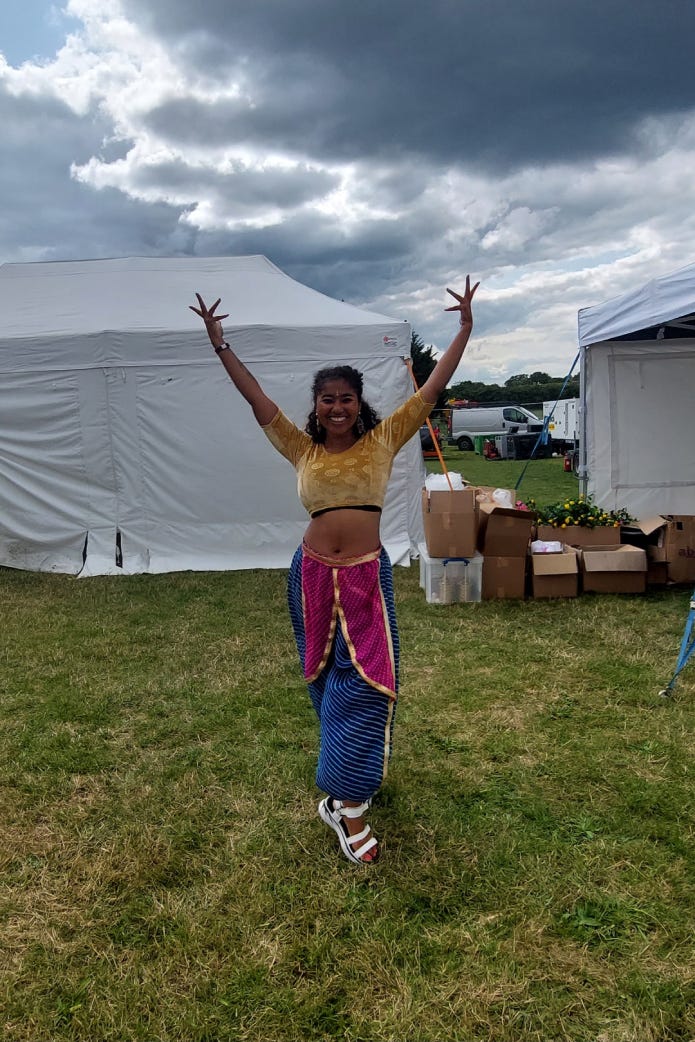Global Roundup: India Reclaim the Night March, Tunisia National Women's Day, Ukraine GBV, Queer Nigerians Fight Back, Bollyqueer Dance class
Curated by FG Contributor Samiha Hossain
tw: rape
Marchers hold posters and candles at a midnight protest in Kolkata on August 14 to condemn the rape and murder of a young medic © DIBYANGSHU SARKAR / AFP
In India, thousands took to the streets of Kolkata on Wednesday night to condemn the rape and murder of a local doctor last week, demanding justice for the victim and an end to violence against women. The march included a candlelight rally at midnight coinciding with the start of India's independence day celebrations. The protesters marched under the slogan "reclaim the night", and held up handwritten signs demanding action. "We want justice," read one sign at the rally. "Hang the rapist, save the women," read another.
We face harassment almost on a daily basis. But not stepping out because of fear is not the solution. -Sangeeta Halder, a protester
Doctors are also demanding swift justice and better workplace security in the wake of the killing, with those in government hospitals across several states on Monday halting elective services "indefinitely" in protest. Protests have since occurred in several other hospitals across the country, including in the capital.
Indian media have reported the 31-year-old murdered doctor was found in the teaching hospital's seminar hall, suggesting she had gone there for a brief rest during a long shift. An autopsy has confirmed sexual assault. Though police have detained a man who worked at the hospital helping people navigate busy queues, officers have been accused of mishandling the case. Kolkata's High Court on Tuesday transferred the case to the elite Central Bureau of Investigation (CBI) to "inspire public confidence". An average of nearly 90 rapes a day were reported in 2022 in India.
Despite scant resources, Kolkata’s Reclaim the Night march appeared to have been meticulously organised. In an advisory, organisers welcomed women and people from marginalised sexual and gender identities to the march. They also emphasised that politicians were not welcome and requested that no party flags be brought to the protest. Sanchari Mukherjee, editor of a digital magazine, said she marched with thousands of others, undeterred by the rain. Mukherjee added that the entire city seemed awake as the marchers passed by illuminated homes, with people peering out of windows and crowding verandahs to watch.
It felt like every young woman was deeply hurt and determined, frustrated that they still face these issues in 2024. I was instantly swept up in a sea of people heading to the protest site. There was no excitement, just a stoic determination to create an event which would become a symbol for the times to come. -Sanchari Mukherjee
Chaima Issa, Tunisia's first political prisoner under Saied, protests on National Women's Day protest in Tunis, 13 August. [Basma Barrakat/Al-Araby Al-Jadeed]
In Tunisia, women's rights activists took to the streets on National Women's Day on Tuesday to protest the authorities' repression of over thirty women judges and activists who were critical of President Kais Saied. The protesters demanded the immediate release of Tunisian women in prison facing charges for exercising their freedom of speech under Saied's rule. Since Saied's power grab in 2021, at least thirty-four women have been arrested, investigated, or barred from travelling, according to the non-government organisation, Legal Agenda.
Every year, on 13 August, Tunisia celebrates National Women's Day. But this year, the day witnessed a small but passionate protest against "the regime's misogyny", as described by Chaima Issa, who was Tunisia's first political prisoner under Saied. Issa was arrested last February with other political figures. She was later released but received a suspended one-year sentence for "offending" the President.
The regime's duality and hatred for women are clear. It's no surprise that female prisoners and bloggers are targeted under Decree 54, with possibly more cases still to come. -Chaima Issa
The latest target of Saied's crackdown was Abir Moussi, head of the Free Destourian Party, who has been imprisoned since October. Last week, she was sentenced to two years in prison, just days after announcing her candidacy for the presidential elections. Moussi was set to be the only woman candidate in the race. Tunisian authorities have also targeted women's organisations challenging the state's anti-migration policies. The president also claimed that the influx of migrants from sub-Saharan Africa is "part of a plot to alter Tunisia's demographic makeup".
Women's rights NGOs fear that many more Tunisian women will be prosecuted under Decree 54, which imposes punishments of up to five-year prison terms for spreading "false news" or "slandering others" and up to ten years if the target is a public official. Signed by Saied in September 2022, this broad-reaching decree has enabled him to suppress dissenting voices, says the opposition.
When Saied first seized extraordinary powers, he gradually dismantled democratically elected bodies, replacing them with new ones directly under his control, and often with a higher rate of women’s representation. Emna Sammari, a Tunisian gender analyst, argues that Saied's focus on gender equality was a distraction to his power grab. He enacted a new constitution in 2022 which required the state to "uphold Islamic values", which could limit human rights, particularly for women, says Human Rights Watch (HRW). Tunisian feminists fear losing legal and social protections they fought hard to secure since the country's independence in 1956.
When a weak democracy descends into authoritarianism, manipulating women's rights is a way to placate Western criticism. -Emna Sammari
Women wear makeup to simulate bruising in a protest against sexual violence in conflict on the streets of Lviv, Ukraine, in June 2023. Photograph: Global Images Ukraine/Getty Images
In May, Lubov Nedoriz, a volunteer social worker, received a call from the police in Pervomaiskyi, a town in the Ukrainian province of Kharkiv. The Russians had just launched an offensive in the region that continues today. The police told her about a 30-year-old man who had recently returned from the frontline in Kharkiv and attacked his mother, who was now worried about his violent and angry behaviour. The mother told Nedoriz that he used to be a good son but changed after he had been sent to the frontline in Kharkiv. Nedoriz, who trained as a criminologist before the war, says such calls for help from law enforcement and women are becoming increasingly common.
With Russia’s war against Ukraine in its third year, many women in the country are now fighting their own battle, as the number of intimate partner violence cases increases significantly. According to Ukraine’s internal affairs ministry, police registered more than 291,000 cases of intimate partner violence across the country in 2023 – a 20% increase on the previous year, when the Russian invasion began. Experts and social workers expect these figures to rise again in 2024. In the first two months of this year, there was a 56% increase in complaints of intimate partner violence that were registered as criminal offences in Ukraine. The reported cases are just “the tip of the iceberg” says Massimo Diana, from the UN’s Population Fund (UNFPA).
In an environment that was inherently patriarchal from the beginning, even before the war, [with] a man who has been on the frontline and is a hero, but has become violent, there’s a problem with reporting. Women often question themselves: ‘how can I complain about anything when my husband, father, son, brother or friend are on the frontlines dying?’ We’ve been hearing this a lot. -Massimo Diana
In Nigeria kito is a term in the local LGBTQ+ community used to describe the ill luck of falling victim to harassment, blackmail, and physical violence by someone believed to be another gay person. The perpetrators of Kito often use dating apps or social media to target their victims. The blackmailers pose as gay men looking to make friends before eventually hurting their victims. They use threats of exposure to force victims to comply with their demands, which often include sexual favours and money. When victims fail to meet these demands, they are humiliated. Perpetrators of this crime are emboldened by the Same-Sex Marriage Prohibition Act (SSMPA), a law that criminalises same-sex relations in Nigeria.
Walter Ude is a contributor on the Kito Diaries blog. This blog documents violence against gay people in Nigeria and puts a face on the perpetrators.
The SSMPA legitimises homophobia; it legitimises attacks on queer people and you find out that some of these acts are also [aided] by police officers. -Walter Ude
Kito is a direct result of institutionalised discrimination against the LGBTQ+ community, said Remi Makinde, interim executive director of The Initiative for Equal Rights (TIERs). According to Makinde, this violence persists because perpetrators know queer people are unlikely to report mistreatment based on their sexual orientation, gender identity, and expression. At least ten people interviewed for 76 Crimes said police were complicit in their extortion or that they got no help when they reported to the police.
76 Crimes found that kito victims sometimes turn to citizen activists since the legal channels are rigged against them. These activists operate like vigilantes and they explore the same technique the blackmailers use to lure their targets. They work with the information they gather from kito victims. Pictures, phone numbers, and the accounts of the blackmailers are important details. Makinde said this strategy has worked in the past but acknowledged that it is not a “long-term solution.”
UK LGBTQ+ Charity Just Like Us ambassador Anuli Changa reveals how a ‘Bollyqueer’ dance class changed her relationship with the term ‘South Asian’. Changa writes about her struggles grappling with her different identities growing up, especially her South Asian identity which she never felt as connected to.
But, when I step outside, I don’t always feel connected to the different facets of my heritage (and rarely all at once). I have grown up often not feeling enough. Not tall enough, pretty enough, Black enough, Indian enough or queer enough. -Anuli Changa
Changa’s relationship to the term South Asian began to change when she discovered the Bollyqueer dance class. According to her, founder Vinay Jobanputra has created a space that empowers people of all dance experiences. Vinay centres queer and trans people, by breaking down gender and sexuality norms in Bollywood dance and recognising those who exist beyond the gender binary.
Bollyqueer classes are full of joy, support, laughter and learning. I truly feel seen, not as a queer person or a South Asian person but as myself, unapologetic, unfiltered, me. Bollyqueer exemplifies the power of being in spaces welcoming all bodies doing what their bodies want to do and celebrating them looking different. -Anuli Changa
Changa now dances as part of the Bollyqueer performance group. She says it’s a way for her to celebrate the intersection of her heritage with her queerness. She acknowledges that South Asian is not a perfect term and one that still doesn’t quite work for her. However, joining Bollyqueer has allowed her to appreciate how powerful the term is for a whole community – a community that she embraces.
Thank you for reading Global Roundup. You can support FEMINIST GIANT by:
Hitting the heart button so that others can be intrigued and read
Upgrading to a paid subscription to help keep FEMINIST GIANT free
Opting for a one-time payment via buying me a coffee
Sharing this post by email or on social media
Samiha Hossain (she/her) is an aspiring urban planner studying at Toronto Metropolitan University. Throughout the years, she has worked in nonprofits with survivors of sexual violence and youth. Samiha firmly believes in the power of connecting with people and listening to their stories to create solidarity and heal as a community. She loves learning about the diverse forms of feminist resistance around the world.






